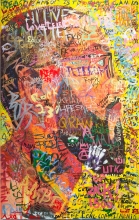The University of Pennsylvania’s Center for Research in Feminist, Queer, and Transgender Studies and the Institute of Contemporary Art invite you to join us for:
Do We Look Free?: Art/Prisons/Liberation
Is art-making a necessary aspect of prison abolition movements? What does the art made by currently or formerly incarcerated artists tell its audiences about various institutions – prisons, galleries, universities? What are local and national organizations doing to participate in the liberation of incarcerated people and their communities?
This panel presentation will examine historical and contemporary art practices linked to anti-carceral movements. Scholar Ofelia Ortiz Cuevas and artists Mary Enoch Elizabeth Baxter and Akeil Robertson-Jowers will present their work and interrogate the links between art practices among incarcerated people and the aesthetics of abolition movements. The panel will be moderated by Ricardo A. Bracho, artist-in-residence at the University of Pennsylvania’s Center for Research in Feminist, Queer, and Transgender Studies and is co-organized by GSWS/FQT and the Institute of Contemporary Art.
Please note that masks/face coverings are required in the auditorium at ICA. Register to attend in person. Register to attend on zoom.
Bios
Mary Enoch Elizabeth Baxter is an award-winning Philadelphia based multidisciplinary artist, activist and educator who creates socially conscious music, film, and visual art through an autobiographical lens. Although it has been a decade since her release from a Pennsylvania prison, Mary’s time spent on the inside continues to shape the direction of her art and practice. Her entertaining but poignant works offer a critical perspective on the particular challenges women of color face when they become immersed in the criminal justice system. Baxter’s work has been exhibited at venues including MoMA PS1, African American Museum of Philadelphia, Frieze LA, Eastern State Penitentiary, Ben & Jerry’s Factory in Waterbury Vermont, Martos Gallery, the National Underground Railroad Freedom Center in Cincinnati and Brown University fall 2022 among others.
Akeil Robertson-Jowers is a multimedia artist, educator, curator, student, returning citizen, and active member of the reentry community. He is deft at navigating the intersection of social analysis and empirical observations derived from lived experiences. He is able to extend those skills to all he comes in contact with and uses these skills to create maps, prose, and bridges toward new thoughts and practices in criminal justice thinking and solutions. Shying away from easy answers or binaries that separate and divide our communities on opposite sides of a restorative justice framework, in his work and scholarship Akeil seeks to take an honest look at the intersections we all share and help us form bonds that encourage the will to remove barriers in our ability to find common ground. Akeil has been a partner in several projects including the Inaugural Philadelphia District Attorney Office Artists in Residency, Reading Work and Art For Justice Led Collaborative Web Project to forward Abolition Studies, and Assistant Muralist of Several Years.
Dr. Ofelia Ortiz Cuevas is an interdisciplinary scholar in the Department of Chicana/o Studies at UC Davis. She received her Ph.D. from the Department of Ethnic Studies at UC San Diego in 2008. Her research is at the intersections of Critical Race Studies, Visual and Cultural studies and Geography and Law. Her work focuses on race, prisons and policing interrogates the critical questions; what lives constitute an ethical crisis? And what is the contemporary value embedded in the practice of racial violence? She was a UC President’s Postdoctoral Fellow and has taught extensively in the UC system. She is currently completing her manuscript, Mortifications of the Flesh: Racial Violence in a Time of Crisis as well as a second book, Policing L.A.’s Human Terrain: The Criminal Non-Human at Point Zero, which examines Los Angeles County jail as a critical point on the city’s cartography of productive human terrain.
Co-sponsored by the Center for Advanced Research in Global Communication.

 The Program in Gender, Sexuality, and Women’s Studies
The Program in Gender, Sexuality, and Women’s Studies